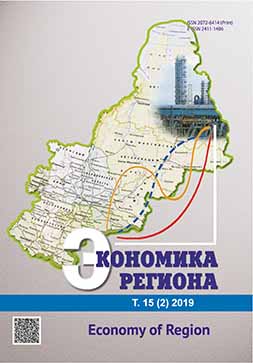ЭФФЕКТЫ МЕЖРЕГИОНАЛЬНОГО ПЕРЕРАСПРЕДЕЛЕНИЯ
ФИНАНСОВЫХ РЕСУРСОВ: ОБЩЕРАВНОВЕСНЫЙ ПОДХОД
Effects of Interregional Redistribution of Financial Resources: a General Equilibrium Approach
Author(s): Artem Gennadevich IsaevSubject(s): Public Finances, Fiscal Politics / Budgeting
Published by: Институт экономики Уральского отделения Российской академии наук
Keywords: regional economy; budget federalism; fiscal capacity; federal transfers; regional tax base; welfare; general equilibrium; Khabarovsk Krai; migration; public goods;
Summary/Abstract: The Russian Federation has a high degree of the socio-economic differentiation among its regions, which objectively requires large-scale redistribution of funds between them. Intergovernmental transfers are one of the main tools of this redistribution.Other things being equal, an increase in transfers to the region leads to an increase in the unpaid goods’ consumption by its residents, which ultimately affects their welfare. Moreover, these changes stimulate interregional migration. Therefore, the resulting change in welfare depends on multiple economic forces. Based on a computable model of general equilibrium with two regions, I assessed the effects of intergovernmental transfers for the Khabarovsk Krai’ economy. The specific feature of the model is the behaviour of regional governments, which optimize the regional tax rate and budget expenditures in a non-cooperative game to maximize the utility function of resident households. The latter are completely mobile between regions and consume two types of goods, private and state-provided ones, under given budgetary restrictions. I carried out simulation estimations for two scenarios differing in motivation incentives of households to change their residency. Calculations have shown that a sharp increase (more than twofold) in the federal budget grants may lead to a significant inflow of labour resources to the recipient region, but changes in welfare, wages and per capita household consumption will be minor. The reason is the behaviour of the regional governments, balancing the households’ consumer basket by changing the volume of local government spending.Ultimately, the actions of regional authorities seeking to maximize the residents’ welfare will result in such changes in tax revenues, which will compensate the increase in households’ consumption of the state-provided goods by the decrease in funding of the same goods from the regional budget.
Journal: Экономика региона
- Issue Year: 15/2019
- Issue No: 2
- Page Range: 618-630
- Page Count: 13
- Language: Russian

